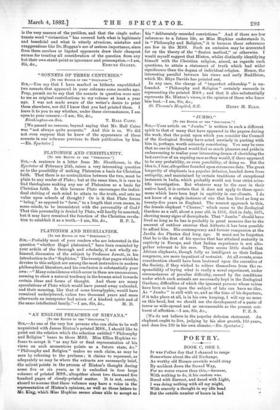PLATONISM AND HEGELIANISM.
[To TWA EDITOR OF THE " SPECTATOR."]
Bia,—Probably most of your readers who are interested in the question "whether Hegel platonised," have been reminded by your article of the thorough and scholarly, if not wholly un- biassed, discussion of the subject by Professor Jowett, in his introduction to the " Sophibtes." Thetwenty-fonr pages which he devotes to this subject are among the most instructive in modern philosophical literature, and his conclusion is substantially your own: —" Many coincidences which occur in them are unconscious, seeming to show a natural tendency in the human mind towards certain ideas and forms of thought. And there are many speculations of Plato which would have passed away unheeded, and their meaning, like that of some hieroglyphic, would have remained undeciphered, unless two thousand years and more afterwards an interpreter had arisen of a kindred spirit and of the same intellectual family."—I am, Sir, &c., M. D.


































 Previous page
Previous page